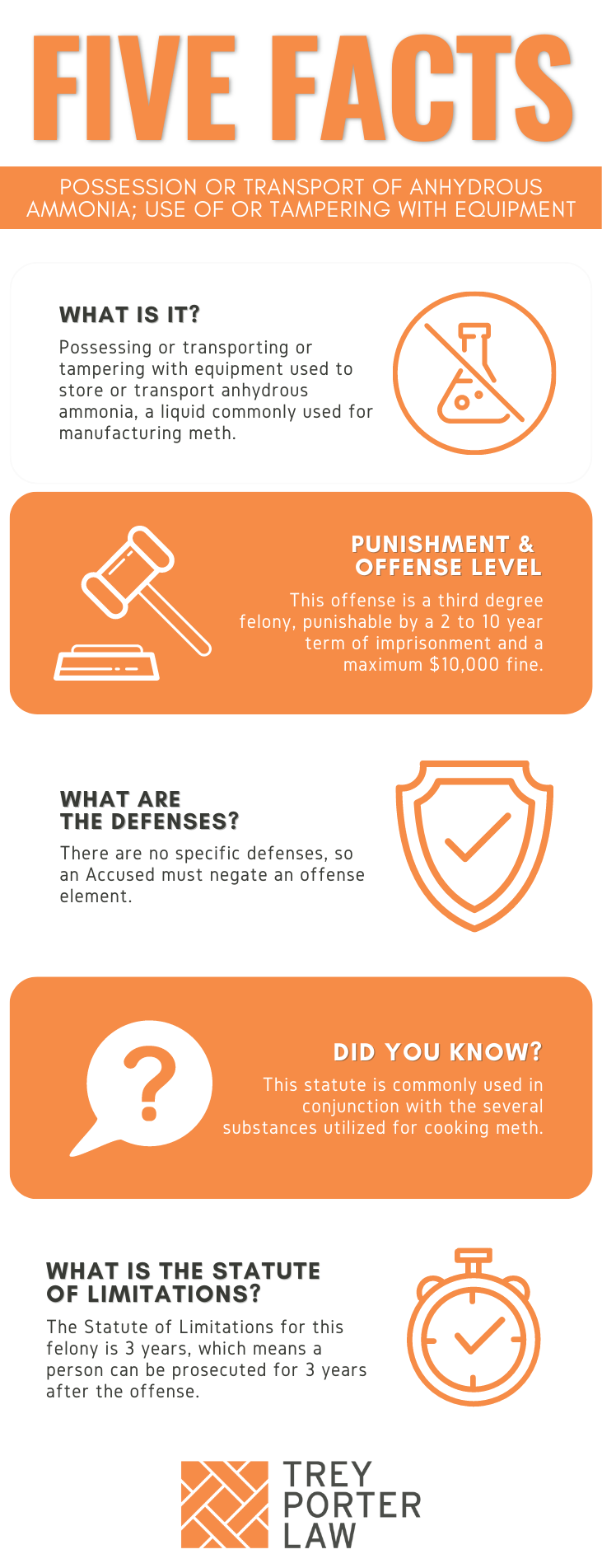WHAT IS POSSESSION OR TRANSPORT OF ANHYDROUS AMMONIA; USE OF OR TAMPERING WITH EQUIPMENT IN TEXAS?
The Texas law against possession or transport of anhydrous ammonia, and use of or tampering with equipment prohibits transporting or having care, custody, control, or management of anhydrous ammonia in a container not designed to hold it, or tampering with equipment used to hold or transport anhydrous ammonia.

- What is anhydrous ammonia? Anhydrous ammonia is a toxic liquid or gas used in manufacturing, refrigeration, and as a fertilizer in the agriculture industry. It is misused for the illegal purpose of manufacturing methamphetamine, and often causes burns and respiratory injuries when handled and stored incorrectly.
WHAT IS THE POSSESSION OR TRANSPORT OF ANHYDROUS AMMONIA; USE OF OR TAMPERING WITH EQUIPMENT LAW IN TEXAS?
Tex. Health & Safety Code § 481.1245. OFFENSE: POSSESSION OR TRANSPORT OF ANHYDROUS AMMONIA; USE OF OR TAMPERING WITH EQUIPMENT.
(a) A person commits an offense if the person:
(1) possesses or transports anhydrous ammonia in a container or receptacle that is not designed or manufactured to hold or transport anhydrous ammonia;
(2) uses, transfers, or sells a container or receptacle that is designed or manufactured to hold anhydrous ammonia without the express consent of the owner of the container or receptacle; or
(3) tampers with equipment that is manufactured or used to hold, apply, or transport anhydrous ammonia without the express consent of the owner of the equipment.
(b) An offense under this section is a felony of the third degree.
WHAT IS THE PENALTY CLASS FOR POSSESSION OR TRANSPORT OF ANHYDROUS AMMONIA; USE OF OR TAMPERING WITH EQUIPMENT IN TEXAS?
The penalty classification for possession or transport of anhydrous ammonia or tampering with equipment is a third degree felony, punishable by two to ten years in prison.
WHAT IS THE PUNISHMENT RANGE FOR POSSESSION OR TRANSPORT OF ANHYDROUS AMMONIA; USE OF OR TAMPERING WITH EQUIPMENT IN TEXAS?
The punishment range for possessing or transporting anhydrous ammonia, or using or tampering with equipment, a third degree felony, is between two and ten years in prison, and a maximum $10,000 fine.
WHAT ARE THE PENALTIES FOR POSSESSION OR TRANSPORT OF ANHYDROUS AMMONIA; USE OF OR TAMPERING WITH EQUIPMENT IN TEXAS?
A person charged with possession or transport of anhydrous ammonia may be eligible for probation after a conviction for a period between two and five years, or deferred adjudication for up to ten years.
WHAT ARE THE DEFENSES TO POSSESSION OR TRANSPORT OF ANHYDROUS AMMONIA; USE OF OR TAMPERING WITH EQUIPMENT IN TEXAS?
The statute does not authorize specific defenses to possession or transport of anhydrous ammonia, or use of or tampering with equipment. A person accused thereof may attempt to negate at least one of the elements the State must prove at trial.
WHAT IS THE STATUTE OF LIMITATIONS FOR POSSESSION OR TRANSPORT OF ANHYDROUS AMMONIA; USE OF OR TAMPERING WITH EQUIPMENT IN TEXAS?
The limitation period for possession or transport of anhydrous ammonia is three years.
POSSESSION OR TRANSPORT OF ANHYDROUS AMMONIA; USE OF OR TAMPERING WITH EQUIPMENT IN TEXAS
In an effort to combat the spread of methamphetamine manufacturing across the state, the Texas Legislature enacted laws punishing possession and transportation of all chemicals used to produce methamphetamine and other harmful substances. Anhydrous ammonia, a fertilizer often used to cook meth, is illegal to possess outside of the agriculture industry, in a container not designed to hold the material.
TEXAS POSSESSION OR TRANSPORT OF ANHYDROUS AMMONIA; USE OF OR TAMPERING WITH EQUIPMENT
The case law regarding possession or transport of anhydrous ammonia in Texas illustrates the proof sufficient to support a conviction.
- In Anderson v. State, police stopped the defendant for failing to signal a turn, and smelled anhydrous ammonia coming from the fire extinguishers in the bed of his truck. They confirmed through testing that the fire extinguishers were holding anhydrous ammonia, and the defendant was convicted of possession thereof. The appellate court affirmed his conviction, finding legally sufficient evidence.
















